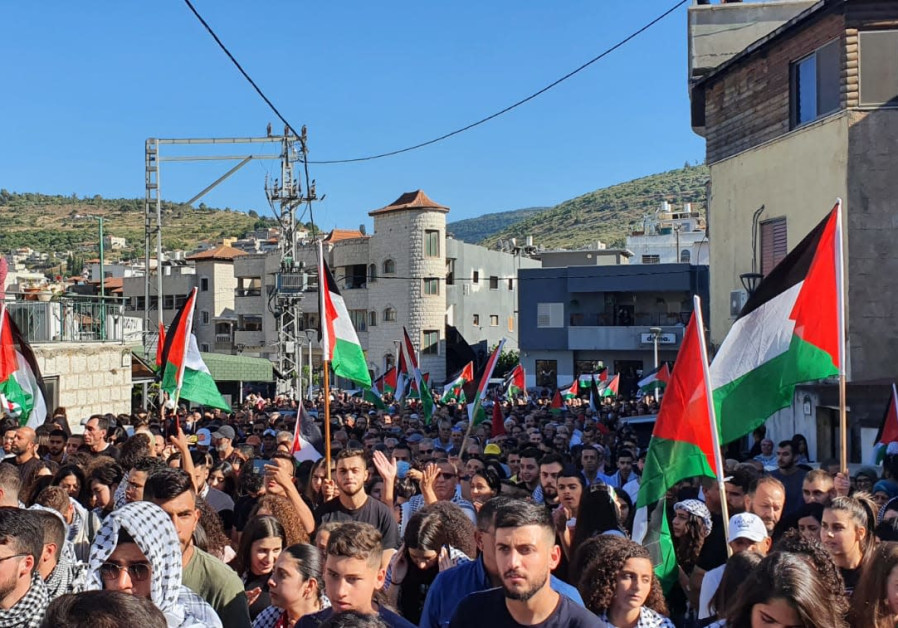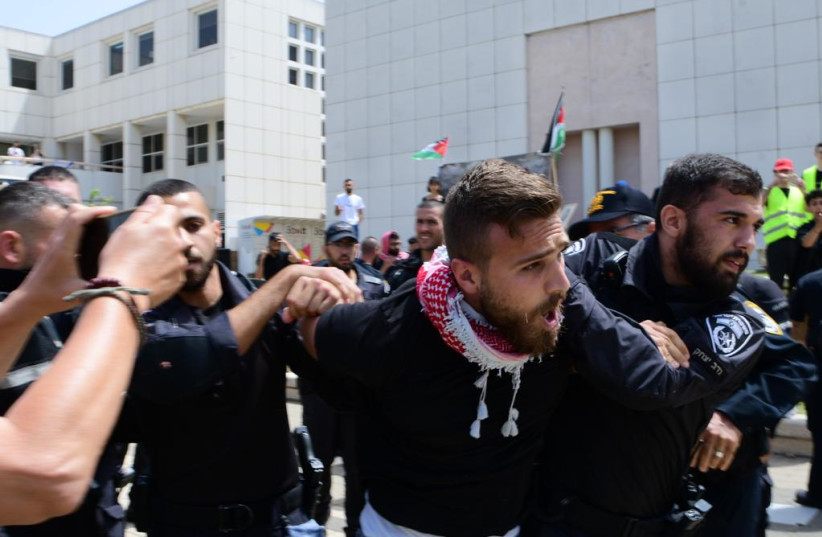
Palestinians and their supporters on Sunday marked “Nakba Day,” or the day of the “catastrophe.”
Why May 15? Because on the Gregorian calendar, this is the day after Israel’s Declaration of Independence in 1948.
Up until 1998, the day was marked in only a minor way: a few strikes, some demonstrations, the flying of black flags. But in 1998, even as the Oslo process was still alive, Yasser Arafat changed all that, deciding that with Israel celebrating its Jubilee anniversary – as it was that year – the Palestinians should mark 50 years to their displacement. As a result, Palestinian rallies – which turned violent – were held both in Israel and in the territories.
Arafat’s choice of this particular day to mark the “nakba’’ was disingenuous. Because for Arafat the “catastrophe” was less David Ben-Gurion declaring independence when the British left Mandatory Palestine, and more about when the army of the nascent Jewish state fought and defeated the invading Arab states that tried to drive it into the sea – just like the cliché says.
In other words, the “catastrophe” was that the Jews won. From the vantage point of the vanquished, this is understandable. In war there are victors and vanquished, and the vanquished will always view their defeat as a catastrophe.

In some cases, however, the vanquished recognize the new reality, pick up the pieces as best they can and move forward. Not here. For the last 74 years, the Palestinians have been trying to undo the “catastrophe” – a catastrophe that could have been avoided had they accepted the offers before the state was created for partition. But they refused, because they wanted it all – a refrain that has repeated itself numerous times since.
Had the Israeli forces not withstood the attack, there would have been no Israel, and the fate of many of the 650,000 Jews gathered in the Yishuv at the time would have been similar to that of six million of their European brethren just a few years earlier: They would have been slaughtered. But at least there would have been no “nakba.”
Arafat succeeded in turning this day into a fixture – often a violent one. Just when one thought that there was some breathing room with the end of Ramadan, up jumps Nakba Day, and the security forces are thrust yet again into high alert. But the protests and riots and marches held in Israel, the West Bank, Gaza and various locations around the world each year do not happen out of sight or earshot.
Average Israelis see these rallies, hear the hateful chants and read the odious placards.
And the message that this sends is that the seemingly endless Israeli-Palestinian conflict, one that has erupted violently again in recent days, is not about a settlement here or a roadblock there. It is not about lands that Israel took control of in the Six Day War in 1967. Rather, it is about lands Jews came back to and settled before 1948.
Nakba Day has a twin sister – “Naksa Day,” the “Day of the Setback” – which falls on June 5. Whereas Nakba Day marks the “catastrophe” that befell the Palestinians in 1948, Naksa Day – marked on the anniversary of the Six Day War – is meant to commemorate the Arab losses during that war of east Jerusalem, the Gaza Strip, the Golan Heights and the Sinai Peninsula. If all those Israeli victories would be rolled back – the Sinai one has been – and Israel would concede all the territories it won in 1967, Naksa Day would cease to exist,
“Nakba Day,” however, would remain – until the “catastrophe” would be rolled back.
SINCE THE War of Independence, there have been many different stabs at rolling it back. There was the Six Day War and the Yom Kippur War. Those were efforts by organized Arab armies to quash the Jewish state. Then there have been terrorist attempts: the First Intifada and the Second Intifada.
Hamas is hell-bent on continuing the battle to undo the catastrophe, and in this battle they are joined by the Palestinian Authority. Hamas, and an assortment of other Palestinian terrorist groups like Islamic Jihad, are trying to undo the “catastrophe” via military means, while the PA is trying to bring this about through diplomatic channels.
Hamas continues with its terrorist war. The PA, meanwhile, carries on with a diplomatic one aimed at delegitimizing the Jewish state: accuse of it of ethnic cleansing, apartheid and murdering journalists. It’s a two-pronged strategy: military and diplomatic, and it is never-ending.
Which makes trends that are taking place among the Arab-Israeli minority, comprising 21% of the country’s population, fascinating to watch.
There are two competing and contrasting trends. One is a radicalization of the Arab-Israeli population, a radicalization that sent shudders through the Jewish population last May during Operation Guardian of the Walls in Gaza when – for the first time in Israel’s history – Arab-Israelis rioted and resorted to violence inside the country’s borders as it was engaged in combat.
The other trend is completely the opposite: It is toward Arab Israelis recognizing the reality of Israel, realizing it won’t be rolled back, and striving for greater integration and a more equitable division of the national pie. And that trend is represented by Mansour Abbas, the head of the Ra’am Party, who said that Israel will remain a Jewish state.
Israel’s interest is to encourage the trend represented by Abbas, and discourage that which leads to the greater radicalization of the Arab population. The radical trend also has representation in the Knesset: the United Arab List, headed by Ayman Odeh, and counting among its ranks Ahmad Tibi and radical left-with Jewish parliamentarian Ofer Cassif.
Over the last week, both trends have been broadcast into Israeli living rooms on the nightly news.
Last week, after much deliberation, Abbas gave an impromptu press conference in the Knesset – on the day that Al Jazeera’s Shireen Abu Akleh was killed in Jenin – saying that it would give the government another chance and would, at least for now, remain in the coalition.
Many Jews were aghast that the country was hanging on the word of the party’s Islamic and religious leaders, the Shura Council, who would – much as Shas and United Torah Judaism’s Council of Torah Sages in days of old – determine the fate of the government. Indeed, it was a stunning development. Yet it illustrated the integration of the Arab sector into Israeli life. Here was a party working within the system not to undo the Jewish state, but rather to integrate into it for the benefit of the Arab population.
Over the weekend other pictures emerged, showing the other trend: a video of Cassif – stopped on his way to a protest in the southern Hebron Hills – striking a policeman, and Tibi spiriting away from police custody a protester detained Friday during Akleh’s funeral.
Abbas’s move illustrated a desire to work with the state, and Tibi and Cassif’s outlandish acts showed those who wanted to work against it. The United Arab MKs’ actions are just a continuation of Odeh’s words last month, calling upon all those Arabs serving in Israel’s security forces to “throw your guns in their faces and tell them our place is not with you.”
One of the reasons Ra’am obviously decided to give the new government another chance was because if elections were held today, according to a Channel 13 poll last week, this party would fail to pass the 3.25% voter threshold to win a seat in the Knesset, dropping from their current four seats to zero. Tibi and Odeh’s party, on the other hand, would go from six in the current Knesset to eight in the next one.
All those who were aghast that Ra’am’s Shura Council was determining the fate of the government, should ask themselves whether they prefer Odeh’s slogan: “Throw your guns in their faces and tell them our place is not with you,” a slogan that would fit in well at any one of the Nakba Day rallies where the vision is to roll back the “catastrophe.”







